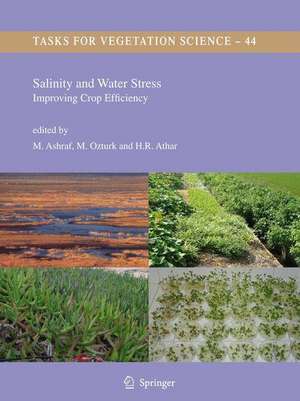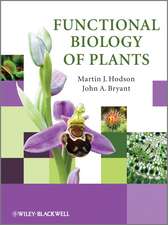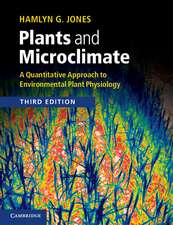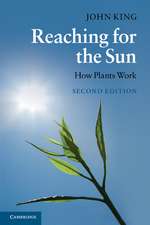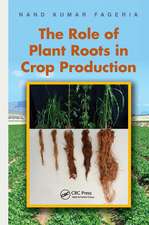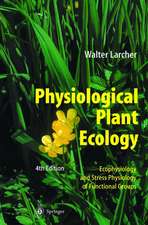Salinity and Water Stress: Improving Crop Efficiency: Tasks for Vegetation Science, cartea 44
Editat de M. Ashraf, M. Ozturk, Habib-ur-Rehman Atharen Limba Engleză Hardback – 22 dec 2008
Presenting recent research findings on salt stress, water stress and stress-adapted plants, this book offers insights into new strategies for increasing the efficiency of crops under stressful environments. The strategies are based on conventional breeding and advanced molecular techniques used by plant physiologists, and are discussed using specific case studies to illustrate their potential. The book emphasizes the effects of environmental factors on specific stages of plant development, and discusses the role of plant growth regulators, nutrients, osmoprotectants and antioxidants in counteracting their adverse affects.
Synthesising updated information on mechansisms of stress tolerance at cell, tissue and whole-plant level, this book provides a useful reference text for post graduate students and researchers involved in the fields of stress physiology and plant physiology in general, with additional readership amongst researchers in horticulture, agronomy, crop science, conservation, environmental management and ecological restoration.
| Toate formatele și edițiile | Preț | Express |
|---|---|---|
| Paperback (1) | 950.52 lei 6-8 săpt. | |
| SPRINGER NETHERLANDS – 25 noi 2010 | 950.52 lei 6-8 săpt. | |
| Hardback (1) | 956.03 lei 6-8 săpt. | |
| SPRINGER NETHERLANDS – 22 dec 2008 | 956.03 lei 6-8 săpt. |
Din seria Tasks for Vegetation Science
-
 Preț: 34.59 lei
Preț: 34.59 lei - 18%
 Preț: 1219.16 lei
Preț: 1219.16 lei - 20%
 Preț: 554.66 lei
Preț: 554.66 lei -
 Preț: 394.12 lei
Preț: 394.12 lei -
 Preț: 396.02 lei
Preț: 396.02 lei -
 Preț: 402.76 lei
Preț: 402.76 lei - 24%
 Preț: 790.13 lei
Preț: 790.13 lei - 18%
 Preț: 1825.75 lei
Preț: 1825.75 lei - 18%
 Preț: 1218.69 lei
Preț: 1218.69 lei - 24%
 Preț: 784.53 lei
Preț: 784.53 lei - 18%
 Preț: 1233.69 lei
Preț: 1233.69 lei -
 Preț: 73.90 lei
Preț: 73.90 lei - 18%
 Preț: 1222.01 lei
Preț: 1222.01 lei - 18%
 Preț: 952.09 lei
Preț: 952.09 lei - 18%
 Preț: 1225.94 lei
Preț: 1225.94 lei -
 Preț: 388.31 lei
Preț: 388.31 lei -
 Preț: 391.40 lei
Preț: 391.40 lei - 18%
 Preț: 1220.45 lei
Preț: 1220.45 lei - 18%
 Preț: 949.23 lei
Preț: 949.23 lei - 18%
 Preț: 943.73 lei
Preț: 943.73 lei - 18%
 Preț: 1238.11 lei
Preț: 1238.11 lei - 18%
 Preț: 1232.26 lei
Preț: 1232.26 lei - 24%
 Preț: 796.72 lei
Preț: 796.72 lei - 24%
 Preț: 1068.94 lei
Preț: 1068.94 lei -
 Preț: 368.39 lei
Preț: 368.39 lei - 18%
 Preț: 1230.03 lei
Preț: 1230.03 lei - 24%
 Preț: 783.41 lei
Preț: 783.41 lei - 18%
 Preț: 948.16 lei
Preț: 948.16 lei - 18%
 Preț: 948.61 lei
Preț: 948.61 lei - 24%
 Preț: 1053.39 lei
Preț: 1053.39 lei
Preț: 956.03 lei
Preț vechi: 1165.88 lei
-18% Nou
Puncte Express: 1434
Preț estimativ în valută:
182.97€ • 190.51$ • 154.63£
182.97€ • 190.51$ • 154.63£
Carte tipărită la comandă
Livrare economică 10-24 martie
Preluare comenzi: 021 569.72.76
Specificații
ISBN-13: 9781402090646
ISBN-10: 1402090641
Pagini: 260
Ilustrații: XIII, 244 p.
Dimensiuni: 178 x 254 x 18 mm
Greutate: 0.75 kg
Ediția:2009
Editura: SPRINGER NETHERLANDS
Colecția Springer
Seria Tasks for Vegetation Science
Locul publicării:Dordrecht, Netherlands
ISBN-10: 1402090641
Pagini: 260
Ilustrații: XIII, 244 p.
Dimensiuni: 178 x 254 x 18 mm
Greutate: 0.75 kg
Ediția:2009
Editura: SPRINGER NETHERLANDS
Colecția Springer
Seria Tasks for Vegetation Science
Locul publicării:Dordrecht, Netherlands
Public țintă
ResearchCuprins
Salt and Water Stress.- Strategies for Crop Improvement Against Salinity and Drought Stress: An Overview.- Prediction of Salinity Tolerance Based on Biological and Chemical Properties of Acacia Seeds.- Antioxidant-Enzyme System as Selection Criteria for Salt Tolerance in Forage Sorghum Genotypes (Sorghum bicolor L. Moench).- Genetic Variation in Wheat (Triticum aestivum L.) Seedlings for Nutrient Uptake at Different Salinity and Temperature Regimes.- The Role of Plant Hormones in Plants Under Salinity Stress.- Effects of Temperature and Salinity on Germination and Seedling Growth of Daucus carota cv. nantes and Capsicum annuum cv. sivri and Flooding on Capsicum annuum cv. sivri.- Triticeae: The Ultimate Source of Abiotic Stress Tolerance Improvement in Wheat.- Water Loss and Gene Expression of Rice (Oryza sativa L.) Plants Under Dehydration.- Effect of Different Water Table Treatments on Cabbage in Saline Saemangeum Soil.- How Does Ammonium Nutrition Influence Salt Tolerance in Spartina alterniflora Loisel?.- Improving Crop Efficiency.- Strategies for Crop Improvement in Saline Soils.- Role of Vetiver Grass and Arbuscular Mycorrhizal Fungi in Improving Crops Against Abiotic Stresses.- Cell Membrane Stability (CMS): A Simple Technique to Check Salt Stress Alleviation Through Seed Priming with GA3 in Canola.- Using Resources from the Model Plant Arabidopsis thaliana to Understand Effects of Abiotic Stress.- Improvement of Salt Tolerance Mechanisms of Barley Cultivated Under Salt Stress Using Azospirillum brasilense.- Genetic Resources for Some Wheat Abiotic Stress Tolerances.- Survival at Extreme Locations: Life Strategies of Halophytes.- Adaptive Mechanisms of Halophytes in Desert Regions.- Is Sustainable Agriculture with Seawater Irrigation Realistic?.- Enhanced Tolerance of Transgenic Crops Expressing Both Superoxide Dismutase and Ascorbate Peroxidase in Chloroplasts to Multiple Environmental Stress.- Adaptation to Iron-Deficiency Requires Remodelling of Plant Metabolism: An Insight in Chloroplast Biochemistry and Functionality.- Boron Deficiency in Rice in Pakistan: A Serious Constraint to Productivity and Grain Quality.- Potential Role of Sabkhas in Egypt: An Overview.
Textul de pe ultima copertă
Salinity and water stress limit crop productivity worldwide and generate substantial economic losses each year, yet innovative research on crop and natural resource management can reveal cost-effective ways in which farmers can increase both their productivity and their income.
Presenting recent research findings on salt stress, water stress and stress-adapted plants, this book offers insights into new strategies for increasing the efficiency of crops under stressful environments. The strategies are based on conventional breeding and advanced molecular techniques used by plant physiologists, and are discussed using specific case studies to illustrate their potential. The book emphasizes the effects of environmental factors on specific stages of plant development, and discusses the role of plant growth regulators, nutrients, osmoprotectants and antioxidants in counteracting their adverse affects.
Synthesising updated information on mechansisms of stress tolerance at cell, tissue and whole-plant level, this book provides a useful reference text for post graduate students and researchers involved in the fields of stress physiology and plant physiology in general, with additional readership amongst researchers in horticulture, agronomy, crop science, conservation, environmental management and ecological restoration.
Presenting recent research findings on salt stress, water stress and stress-adapted plants, this book offers insights into new strategies for increasing the efficiency of crops under stressful environments. The strategies are based on conventional breeding and advanced molecular techniques used by plant physiologists, and are discussed using specific case studies to illustrate their potential. The book emphasizes the effects of environmental factors on specific stages of plant development, and discusses the role of plant growth regulators, nutrients, osmoprotectants and antioxidants in counteracting their adverse affects.
Synthesising updated information on mechansisms of stress tolerance at cell, tissue and whole-plant level, this book provides a useful reference text for post graduate students and researchers involved in the fields of stress physiology and plant physiology in general, with additional readership amongst researchers in horticulture, agronomy, crop science, conservation, environmental management and ecological restoration.
Caracteristici
Many different contributors give insight in their specific views on the topics (highly interesting for scientists working in this field) Authors from various geographical regions Topical: abiotic stress is the most important factor for crop yield reduction Practical examples provide state of the art information Provides reference material for abiotic stress researchers
